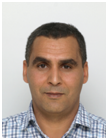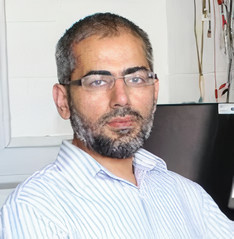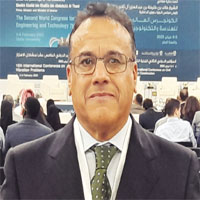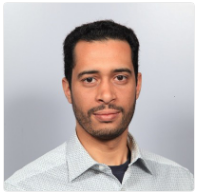
|
|
|
Keynote Speakers********************Keynote Academic Speakers**************************
------------------------------------------------------------------------------------------------------------------------------ Title: Cloud Architecture of Soft Skills based on Deep Learning Abstract: Nowadays, Soft skills remain a very important area for the development and the construction of society which represents a fundamental challenge for universities. They mainly aim to become an organization capable of providing human capital for the development of countries either at the level of research or creation, especially in the field of industry. In this sense, universities should have academic, relevant, adequate, practical and appropriate programs which facilitate students' access to the world of work which requires a high level of soft skills; namely, critical thinking, problem solving, leadership, professionalism / work ethic, teamwork / collaboration and adaptability / flexibility. Our objective in this conference is to provide a supervised, iterative and intra-recursive architecture in terms of learning loops, and multi-hybrid in terms of deployment. Its aim is to complete the spirit of self-training of the learner based on beneficial analysis and detection, improvement and development of its technical and non-technical skills, regardless of physical constraints (handicap or different learning styles), called Soft Skills Cloud Architecture based on Deep Learning "ACSS". It is defined by sex main phases. 1) Initialing phase, 2) Planning or creation phase of a reference basis which makes it possible to define the most important skills demanded in the job market, 3) Skills detection phase, 4) Skills classification phase, 5) Decision phase and 6) Implementation phase. In addition, our diagram presents a supervised orientation process in which the learner can, in each phase, consult the different means and methods of improvement, thus, it offers the advantage of self-evolution. ------------------------------------------------------------------------------------------------------------------------------ Title: IoT, Big Data Technologies and Predictive Approaches for the Development of Context-driven Applications Abstract: Recent advances in pervasive technologies, such as wireless ad hoc networks and wearable sensor devices, allow the connection of everyday things to the Internet, commonly denoted as Internet of Things (IoT). IoT is seen as an enabler to the development of intelligent and context-aware services and applications. These services could dynamically react to the environment changes and users’ preferences. The main aim is to make users’ life more comfortable according to their locations, current requirements, and on-going activities. However, handling dynamic and frequent context changes is a difficult task without a real-time event/data acquisition and processing platform. Big data, WSN, and IoT technologies have been recently proposed for timely gathering and analysing information (i.e., data, events) streams. In this talk, we shed more light on the potential of these technologies for continuous and real-time data monitoring and processing in different real-case applications (e.g, Healthcare, energy efficient building, smart grid). ------------------------------------------------------------------------------------------------------------------------------
Title: “Machine Learning for Detecting Internet Traffic Anomalies” Abstract: Border Gateway Protocol (BGP) enables the Internet data routing. BGP anomalies may affect the Internet connectivity and cause routing disconnections, route flaps, and oscillations. Hence, detection of anomalous BGP routing dynamics is a topic of great interest in cybersecurity. Various anomaly and intrusion detection approaches based on machine learning have been employed to analyze BGP update messages collected from RIPE and Route Views collection sites. Survey of supervised and semi-supervised machine learning algorithms for detecting BGP anomalies and intrusions is presented. Deep learning, broad learning, and gradient boosting decision tree algorithms are evaluated by creating models using collected datasets that contain Internet worms, power outages, and ransomware events. ------------------------------------------------------------------------------------------------------------------------------ Title: Trust-based decentralized blockchain system with machine learning using the Internet of Agriculture things
Abstract: The growth of the Internet of Agriculture Things (IoAT) with wireless technologies has resulted in significant advances for intelligent farming systems. However, various techniques have been presented to predict the soil and crop conditions. Nonetheless, providing a quality-enabled autonomous system is one of the critical research challenges. Furthermore, in the event of network overloading, most existing work needs help to handle trustworthy communication. In this session, I will discuss our latest research work where we proposed an intelligent optimization model to develop reliable and quality-aware sustainable agriculture using machine learning. Firstly, the proposed model utilizes intelligent devices to automate data collection and transmission. It analyzes the independent performance variables to support the consistent decision-making process for the forwarding scheme. Secondly, the proposed model investigated blockchain-based security principles for integrating the trusted system to reduce communication interference. The proposed model has been validated through simulations, and numerous experiments have demonstrated its efficacy regarding network parameters.
------------------------------------------------------------------------------------------------------------------------------
Title: Towards trustworthy Artificial Intelligence enabled assistive healthcare technologies Abstract: Pioneering multi-disciplinary research at Edinburgh Napier University is developing trustworthy artificial intelligence (AI) approaches to transform assistive healthcare technologies. This talk will provide an introduction to trustworthy AI and outline a number of practical use cases including future research directions and challenges. ---------------------------------------------------------------------------------------------------------------------------- Title: Detection of Falsified Messages in Internet of Vehicle by Machine Learning Abstract: The penetration of Internet of Things (IoT) into the transportation sector has given rise to a new networking paradigm called the Internet of Vehicles (IoV). In IoVs, vehicles periodically broadcast their current position, speed, and acceleration as Basic Safety Messages (BSMs) using the Dedicated Short Range Communications (DSRC) technique. Safety-critical applications like blind-spot warning and lane change warning systems use the BSMs to ensure the safety of road users. However, adversaries can modify the contents of the messages which affects the efficacy of the developed applications. One type of attack is the position falsification attack, by which the attacker inserts incorrect information regarding the vehicles’ position into the BSMs and broadcasts it to the nearby vehicles. Existing position falsification attack detection systems in literature use supervised learning techniques that cannot detect and learn about new position falsification attacks emerging in the network. In this talk, I will present a Novel Position Falsification Attack Detection System for the IoV (NPFADS for IoV) to detect new position falsification attacks. The performance of NPFADS is quantitatively measured using the metrics of precision, recall, F1 score, and ROC curves. The Vehicular Reference Misbehaviors (VeReMi) dataset is used as the benchmark dataset for training. The system’s performance is also compared to some existing position falsification attack detection systems in the literature. The performance analysis on the NPFADS shows that it performs on par with the existing supervised learning models even when initialized with zero knowledge about new position falsification attacks. ------------------------------------------------------------------------------------------------------------------------------
Title: Threat Intelligence and Machine Learning: A Powerful Combination for Cybersecurity Abstract: Machine learning and threat intelligence combined provide a potent cybersecurity tool. While unstructured data can be analyzed with machine learning, threat intelligence entails gathering and evaluating data to foresee new assaults. Additionally, risk exposure assessment, alert management, raw data analysis, and cyber threat intelligence can all benefit from machine learning. It is imperative that each customer concentrates on the threat landscape that pertains to them, as the majority of the threat landscape is unimportant to most firms. By automatically generating a customized threat profile and making it easier for analysts to enrich that threat profile by providing them with AI-based natural language processing capabilities, the threat environment may be made more personalized. The question of whether open-source intelligence can be successfully incorporated into a practical method that reliably categorizes cyber threat intelligence can also be answered using machine learning. Machine learning and rule-based algorithms are used in the processing pipeline of the threat intelligence machine to convert unstructured data from open, technical sources into organized, useful intelligence. To strengthen cybersecurity, machine learning can also be utilized to visualize trends in CTI data. In summary, this speech discusses how threat intelligence and machine learning together can offer a strong basis for artificial intelligence (AI) solutions that can safeguard companies from online attacks. ------------------------------------------------------------------------------------------------------------------------------ Prof. Dr. Mohamed-Slim Alouini. Dr. Mohamed-Slim Alouini was born in Tunis, Tunisia. He received the Ph.D. degree in Electrical Engineering from the California Institute of Technology (Caltech) in 1998. He served as a faculty member at the University of Minnesota then in the Texas A&M University at Qatar before joining in 2009 the King Abdullah University of Science and Technology (KAUST) where he is now a Distinguished Professor of Electrical and Computer Engineering. Prof. Alouini is a Fellow of the IEEE and OPTICA (Formerly the Optical Society of America (OSA)). He is currently particularly interested in addressing the technical challenges associated with the uneven distribution, access to, and use of information and communication technologies in rural, low-income, disaster, and/or hard-to-reach areas. Title: Towards Extreme Band Communications Abstract: A rapid increase in the use of wireless services over the last few decades has led to the problem of radio-frequency (RF) spectrum exhaustion. More specifically, due to this RF spectrum scarcity, additional RF bandwidth allocation, as utilized in the recent past over "traditional bands", is not anymore enough to fulfill the demand for more wireless applications and higher data rates. The talk goes first over the potential offered by extreme band communication (XB-Com) systems to relieve spectrum scarcity. Indeed, mm-wave, THz, and free space optics broadband wireless systems recently attracted several research interests worldwide due to the progress in electronics and photonics technologies. By utilizing these extreme frequency bands and employing extreme large bandwidths, the 6G target data rates over 100 Gbps could be achieved. The talk then summarizes some of the challenges that need to be surpassed before such kinds of systems can be deployed. For instance, it explains how the THz transmission band has immunity against the fog compared with the optical one, while being affected by the rain as it is the case for the mm-wave band. In addition, the role of ultra-massive multiple-input multiple-output (UM-MIMO) systems and reconfigurable intelligent surfaces in overcoming the distance problem at very high frequencies will be discussed. Finally, the talk offers an overview of some recent studies illustrating how these different XB-Com technologies can collaborate to increase emerging and future networks' reliability and coverage while maintaining their high capacity. ------------------------------------------------------------------------------------------------------------------------------
Title: Facial Expression Recognition based on Deep Learning Models ----------------------------------------------------------------------------------------------------------------------
Title: Using Embodied Conversational Agents and Antromorphic Objects to Interact More Naturally in Smart Environments Abstract: Smart environments are typically accessed via smartphones/tablets or voice assistants that rely on no or small displays. However, alternative forms of presentation could allow a seamless integration into the environment and potentially reduce distractions and provide a more natural interface. The invited talk will present various examples and the results of specific user studies. --------------------------------------------------------------------------------------------------------------------------
Titre: Éthique, Droit, Intelligence Artificielle et Société Abstract: Nous vivons dans une époque où la technologie avance à grande vitesse. Cette évolution (révolution) a un impact sur la règle du droit en particulier et sur la société en général. Aux problèmes propres à la protection des données personnelles s'ajoutent les risques, plus récents, soulevés par l'arrivée de l'Intelligence Artificielle (IA) . L'intelligence artificielle nous met face à de nouveaux défis éthiques : protection de la démocratie, fake news, atteinte à la vie privée ou encore protection des données à caractère personnel... Dans un monde ultra-connecté, des critiques s'élèvent pour dénoncer le potentiel dévastateur du numérique pour la démocratie : manipulation d'élections, fake news, cyber attaques, propos haineux... Mais l'intelligence artificielle peut aussi être bénéfique cours à distance, opérations chirurgicales à distance, Smart City... -------------------------------------------------------------------------------------------------------------------------------------------
Titre: Abaqus Modeling for composite framework Joint Exposure to Unexpected Events Abstract: ------------------------------------------------------------------------------------------------------------------------------------------------
Prof. Manju Mandot is working as Professor and Director, Department of Computer Science and IT, JRN, Rajasthan Vidhyapeeth (Deemed to be University), Udaipur. She worked upfront in ideating and creating successful departments in the field of Agriculture, Social Work, and Computer Science. Prof. Manju Mandot, alumni of Banasthali Vidhyapeeth, Banasthali and Mohanlal Sukhdia Univresity, Udaipur has demonstrated her intellectual, interpersonal and administrative skills with vast teaching experience in various Institutions with the role ranging from Lecturer to Professor , Dean and Director within a span of approximately 32 years. Her area of interests includes 3D Modeling, Medical Image Processing, Data Mining, Cyber security, Artificial Intelligence and Smart Agriculture. She has published more than 70 papers in reputed International and National journals. She has authored 5 books and edited two books and two patent. Total 10 students have been awarded Ph.D degree under her supervision. Dr. Mandot is life member of Computer Society of India, Presently Chairperson, CSI Udaipur Chapter. She is also the member of Editorial board and review committee of several journals. Prof. Mandot has delivered a number of invited talks on 3D Modelling, Image Processing, Software Engineering, Cloud Computing and Artificial Intelligence at various institutions including Dubai and Thailand, USA, UK. She has organized more than 50 workshops, Conferences and seminar in field of Social Work and Computer Science. Titre: Neurodegenerative Disease Detection Using Medical Imaging Abstract: Current medical imaging systems are capable of providing large amounts of images, which needs in-depth analysis. Normally, experts perform certain evaluation procedures upon the medical images that may lead to operational errors which require huge amount of time for making evaluations. MR images are qualitatively and quantitatively analyzed by experts based on their professional experience, but it is certainly limited by the human vision system, where human eye vision is restricted to analyze 8 bits of grey level. Nowadays, MRI systems are capable of offering images of the organs up to 65,535 gray levels. With the advent of life expectancy and ageing of the population in nation, Alzheimer's disease (AD) is expected to affect 5.2 million country-wise presently and around 60 million people worldwide over the next 50 years. With no cure yet available it is characterized by progressive abnormal structural changes in the brain, with extreme shrinkage of the hippocampus volume or extreme reduction of its cortical thickness, as well as a severe enlargement of the internal ventricles. This multi-modal information needs to be processed in order to extract information exploitable within the context of a particular medical task. Despite of the relevance of these complementary sources of medical knowledge, medical images are rarely further processed in actual clinical practice. So some automatic and efficient approach needs to be implemented to increase diagnostic power of prominent biomarker for early diagnosis which is variable and conclude its stage for both tracking progression of illness and treatment response. The proposed technique will achieve higher accuracy and significant improvement in identifying AD-mild, moderate and severe while maintaining low false-positive rates. Dealing with high-dimensional data is demanding work where correct information extraction and interpretation requires specific domain knowledge. In contrast to conventional data mining techniques, a CNN provides visually understandable results by showing clusters and dependencies between elements through ordering similar objects close to each other. A variety of machine learning methods, applied, represent multi-faced information from input records. A hybrid technique including FCM& convolution neural network (CNN) is used with GLCM features help to find complex correlations and allow retrieving valuable information from those data spaces. Visualizations are scalable, this makes it easier to define and handle the results. This work aims to support radiologists to accelerate their understanding how to analyze and extract features from brain MRI for neurodegenerative disease early diagnosis. *************************Keynote Industrial Speakers***************************
------------------------------------------------------------------------------------------------------------------------------
Title: Machine Learning in Finance Services Explore different use cases of machine learning in Finance Services |
 Professor ASIMI Ahmed is a full professor at the Faculty of Science, Agadir, Morocco. He received his Ph.D degree in Number theory from Department of Mathematics, Faculty of Science, University Mohammed V, Agdal in 2001, Morocco. He is reviewer at the International Journal of Network Security (IJNS). His main areas of research interests include Number theory, Code theory, Computer Cryptology, Computer and Network Security.
Professor ASIMI Ahmed is a full professor at the Faculty of Science, Agadir, Morocco. He received his Ph.D degree in Number theory from Department of Mathematics, Faculty of Science, University Mohammed V, Agdal in 2001, Morocco. He is reviewer at the International Journal of Network Security (IJNS). His main areas of research interests include Number theory, Code theory, Computer Cryptology, Computer and Network Security. Professor Mohamed BAKHOUYA is a professor of computer science at the International University of Rabat. He obtained his HDR from UHA-France in 2013 and his PhD from UTBM-France in 2005. He has more than ten years experiences in participating and working in sponsored ICT projects. He was EiC of IJARAS journal and also serves as a guest editor of a number of international journals, e.g.,ACM Trans. on Autonomous and Adaptive Systems, Product Development Journal, Concurrency and Computation: Practice and Experience, FGCS, and MICRO. He has published several papers in international journals, books, and conferences. His research interests include various aspects related to the design, validation, and implementation of distributed and adaptive systems, architectures, and protocols.
Professor Mohamed BAKHOUYA is a professor of computer science at the International University of Rabat. He obtained his HDR from UHA-France in 2013 and his PhD from UTBM-France in 2005. He has more than ten years experiences in participating and working in sponsored ICT projects. He was EiC of IJARAS journal and also serves as a guest editor of a number of international journals, e.g.,ACM Trans. on Autonomous and Adaptive Systems, Product Development Journal, Concurrency and Computation: Practice and Experience, FGCS, and MICRO. He has published several papers in international journals, books, and conferences. His research interests include various aspects related to the design, validation, and implementation of distributed and adaptive systems, architectures, and protocols.

 Professor Amir Hussain is Professor and founding Director of the Centre of AI and Robotics at Edinburgh Napier University, UK. His research interests are cross-disciplinary and industry-led, aimed at developing cognitive data science and trustworthy AI technologies to engineer smart healthcare and industrial systems of tomorrow. He has (co)authored around 600 research publications, including over 250 journal papers and 20 Books/monographs. He has supervised over 40 PhD students and led major national and international projects. He is currently managing research grants totalling over £5 Million, including as Lead Principal Investigator for the COG-MHEAR Programme Grant (funded under the UK EPSRC Transformative Healthcare Technologies 2050 Call) that aims to develop truly personalised, multi-modal hearing assistive technology. He is also leading a related UK EPSRC project that is developing privacy-preserving and emotion-sensitive conversational agents for natural language dialogue in low-resource domains. He is founding Chief Editor of Springer’s Cognitive Computation journal (Impact factor: 5.4) and invited editorial board member for Elsevier’s Information Fusion and several IEEE Transactions including on: Neural Networks and Learning Systems; Artificial Intelligence; Systems, Man and Cybernetics (Systems); and Emerging Topics in Computational Intelligence. He has served as General Chair of IEEE WCCI 2020 (the world’s largest IEEE CIS technical event on computational intelligence, comprising the IJCNN, FUZZ-IEEE and IEEE CEC) and is currently General Chair of the 2023 IEEE Smart World Congress. He is an Executive Committee member of the UKCRC (the national expert panel of the IET and the BCS for UK computing research) and Chapter Chair of the IEEE UK and Ireland Industry Applications Society.
Professor Amir Hussain is Professor and founding Director of the Centre of AI and Robotics at Edinburgh Napier University, UK. His research interests are cross-disciplinary and industry-led, aimed at developing cognitive data science and trustworthy AI technologies to engineer smart healthcare and industrial systems of tomorrow. He has (co)authored around 600 research publications, including over 250 journal papers and 20 Books/monographs. He has supervised over 40 PhD students and led major national and international projects. He is currently managing research grants totalling over £5 Million, including as Lead Principal Investigator for the COG-MHEAR Programme Grant (funded under the UK EPSRC Transformative Healthcare Technologies 2050 Call) that aims to develop truly personalised, multi-modal hearing assistive technology. He is also leading a related UK EPSRC project that is developing privacy-preserving and emotion-sensitive conversational agents for natural language dialogue in low-resource domains. He is founding Chief Editor of Springer’s Cognitive Computation journal (Impact factor: 5.4) and invited editorial board member for Elsevier’s Information Fusion and several IEEE Transactions including on: Neural Networks and Learning Systems; Artificial Intelligence; Systems, Man and Cybernetics (Systems); and Emerging Topics in Computational Intelligence. He has served as General Chair of IEEE WCCI 2020 (the world’s largest IEEE CIS technical event on computational intelligence, comprising the IJCNN, FUZZ-IEEE and IEEE CEC) and is currently General Chair of the 2023 IEEE Smart World Congress. He is an Executive Committee member of the UKCRC (the national expert panel of the IET and the BCS for UK computing research) and Chapter Chair of the IEEE UK and Ireland Industry Applications Society.
 Dr. Hamed Taherdoost is faculty member of University Canada West. He holds PhD of Computer Science and Master of Information Security. He has over 20 years of experience in both industry and academic sectors. He has worked at international companies from Cyprus, the UK, Malta, Iran, Malaysia, and Canada and has been highly involved in development of several projects in different industries including oil and gas, healthcare, transportation, and information technology, holding positions as varied as Project Manager, R&D Manager, Tech Lead, and CTO. He has spent the last nine years helping start-ups to grow by implementing new projects and business lines. Apart from his experience in industry, he also has some achievements in academia. He has been a lecturer in three different parts of the world, Southeast Asia, the Middle East, and North America. Besides, he has organized and chaired numerous workshops, conferences, and conference sessions respectively, and has delivered speeches as chief guest and keynote speaker. Moreover, he is the editorial, reviewer, and advisory board member of some authentic peer-reviewed journals publishing with Taylor & Francis, Springer, Emerald, Elsevier, MDPI, EAI, & IGI Publishing, and Inderscience. Hamed has been an active multidisciplinary researcher and R&D specialist involved in several academic and industrial research projects. He has been working with researchers from various disciplines and has been actively engaged in different research studies. His research achievements also include winning several best paper awards and outstanding reviewer awards. His views on science and technology have been published in top-ranked scientific publishers such as Elsevier, Springer, Emerald, IEEE, IGI Global, Inderscience, Taylor and Francis and Dr. Hamed has published over 160 scientific articles in authentic peer-reviewed international journals and conference proceedings (h-index = 31; i10-index = 52; May 2022), ten book chapters as well as eight books in the field of technology and research methodology. He was the finalist for the Innovation in Teaching of Research Methodology Excellence Awards at ECRM, UK in 2022 and was nominated as the finalists in Southeast Asian Startup Awards in 2020 by Global Startup Awards and has been listed on the Stanford-Elsevier list of World’s top 2% of scientist by August 2021. He is a Certified Cyber Security Professional and Certified Graduate Technologist. He is senior member of IEEE, IAEEEE, IASED, and IEDRC and WGM of IFIP TC11 - Assurance and Information Security Management, and member of CSIAC), ACT-IAC, and AASHE. Currently, he is involved in several multidisciplinary research projects, including studying innovation in information technology, blockchain and cybersecurity, and technology acceptance.
Dr. Hamed Taherdoost is faculty member of University Canada West. He holds PhD of Computer Science and Master of Information Security. He has over 20 years of experience in both industry and academic sectors. He has worked at international companies from Cyprus, the UK, Malta, Iran, Malaysia, and Canada and has been highly involved in development of several projects in different industries including oil and gas, healthcare, transportation, and information technology, holding positions as varied as Project Manager, R&D Manager, Tech Lead, and CTO. He has spent the last nine years helping start-ups to grow by implementing new projects and business lines. Apart from his experience in industry, he also has some achievements in academia. He has been a lecturer in three different parts of the world, Southeast Asia, the Middle East, and North America. Besides, he has organized and chaired numerous workshops, conferences, and conference sessions respectively, and has delivered speeches as chief guest and keynote speaker. Moreover, he is the editorial, reviewer, and advisory board member of some authentic peer-reviewed journals publishing with Taylor & Francis, Springer, Emerald, Elsevier, MDPI, EAI, & IGI Publishing, and Inderscience. Hamed has been an active multidisciplinary researcher and R&D specialist involved in several academic and industrial research projects. He has been working with researchers from various disciplines and has been actively engaged in different research studies. His research achievements also include winning several best paper awards and outstanding reviewer awards. His views on science and technology have been published in top-ranked scientific publishers such as Elsevier, Springer, Emerald, IEEE, IGI Global, Inderscience, Taylor and Francis and Dr. Hamed has published over 160 scientific articles in authentic peer-reviewed international journals and conference proceedings (h-index = 31; i10-index = 52; May 2022), ten book chapters as well as eight books in the field of technology and research methodology. He was the finalist for the Innovation in Teaching of Research Methodology Excellence Awards at ECRM, UK in 2022 and was nominated as the finalists in Southeast Asian Startup Awards in 2020 by Global Startup Awards and has been listed on the Stanford-Elsevier list of World’s top 2% of scientist by August 2021. He is a Certified Cyber Security Professional and Certified Graduate Technologist. He is senior member of IEEE, IAEEEE, IASED, and IEDRC and WGM of IFIP TC11 - Assurance and Information Security Management, and member of CSIAC), ACT-IAC, and AASHE. Currently, he is involved in several multidisciplinary research projects, including studying innovation in information technology, blockchain and cybersecurity, and technology acceptance.



 Mr. Mohamed Drissi is a Manager of Analytics Development at FNB Corp (Bank). He started his carrier with in Business Intelligence and EPM systems especially Oracle Hyperion Products in 2012. He worked as consultant for 3 years managing upgrades and administration work related to Hyperion. Later, he worked as business analyst for many years and then moved to data analysis using SAS products. Mohamed took his Bachelor degree in FST Errachidia in Computer Engineering in 2004 and finished his MBA in South University (USA) in 2016.
Mr. Mohamed Drissi is a Manager of Analytics Development at FNB Corp (Bank). He started his carrier with in Business Intelligence and EPM systems especially Oracle Hyperion Products in 2012. He worked as consultant for 3 years managing upgrades and administration work related to Hyperion. Later, he worked as business analyst for many years and then moved to data analysis using SAS products. Mohamed took his Bachelor degree in FST Errachidia in Computer Engineering in 2004 and finished his MBA in South University (USA) in 2016.
